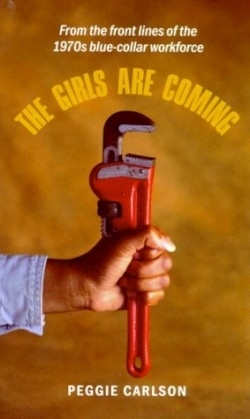Girls Are Coming (Midwest Reflections)
With the passage of the Equal Employment Act of 1972 many women found doors opened to jobs that had previously been reserved for men. Carlson was the first woman hired as a pipefitter by Minnegasco, the Minneapolis Gas Company. In this memoir, Carlson tells sometimes shocking, sometimes funny, anecdotes of her efforts to break new ground for working class women.
In 1974, Carlson was a confused college student seeking a good paying full time job that would allow her to attend classes in the evening. She began her career at Minnegasco as a meter reader, one of the first women so employed but not the first. After a traumatic encounter with a racist homeowner (set up by a fellow employee), she sought a transfer to the buildings and grounds division. Predictably, she met great resistance from some fellow employees who muttered comments about “women libbers” and “lezzies” taking men’s jobs. Much to her surprise, though, it was her gender that caused problems, not her race, those battles having already been fought and mostly won at Minnesgasco by African-American men years before.
The best anecdotes concern not the opposition she received but her co-workers? often fumbling efforts to welcome and accommodate her, such as the time she and a male co-worker were making a repair in a men’s restroom. As a warning to unsuspecting users, her co-worker wrote a sign on a piece of cardboard: “GIRL AT WORK.” Sensing that something about his efforts were not quite right, he stared at the sign, frowned, turned it over and wrote “FEMALE AT WORK—STAY OUT.” Political correctness takes a small step forward.
The Midwest Reflections series of which this book is a part was conceived in part by the press as an opportunity to give a voice to groups whose voices are often missing from the printed record—the working class, rural housewives, etc. It is a pity then, that Carlson seems to have inherited the class prejudices of her upper middle class mother who was appalled to learn her baby girl was taking a job with the gas company. “How misinformed my mother was to think that I could become romantically involved with a gasman,” she writes at one juncture in a comment whose phrasing reveals as much about her own sentiments as it does her mother’s. Another time she thinks, “How could I have been stupid enough to think that I could work with these people?” These people—a different breed obviously.
At the end of her memoir, Carlson reveals that she kept a journal during her years at Minnegasco because she knew that she would eventually write a book about her experiences. With this piece of the puzzle, the narrative perspective becomes clearer. The voice represented in the book is not that of a groundbreaking working class woman, but rather a middle class writer in search of material.
Reviewed by
Erik Bledsoe
Disclosure: This article is not an endorsement, but a review. The publisher of this book provided free copies of the book to have their book reviewed by a professional reviewer. No fee was paid by the publisher for this review. Foreword Reviews only recommends books that we love. Foreword Magazine, Inc. is disclosing this in accordance with the Federal Trade Commission’s 16 CFR, Part 255.

